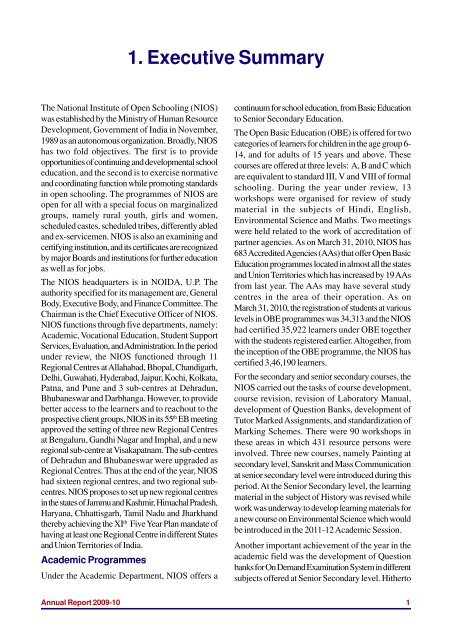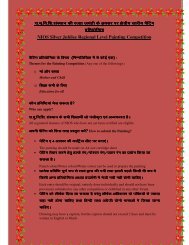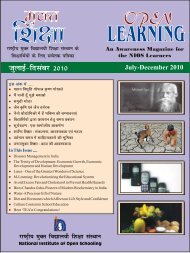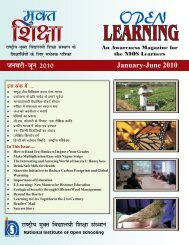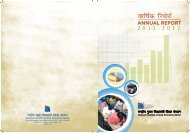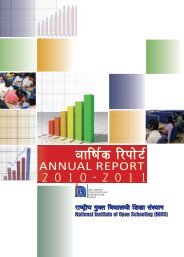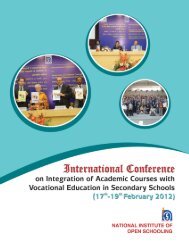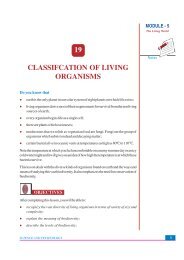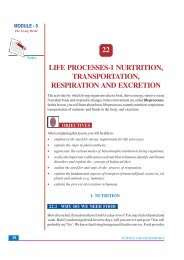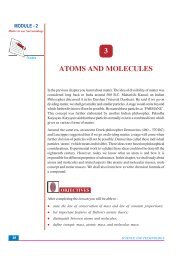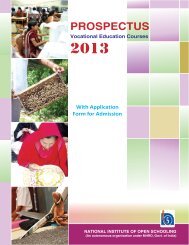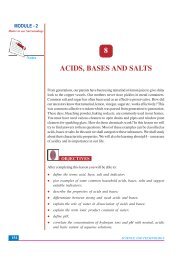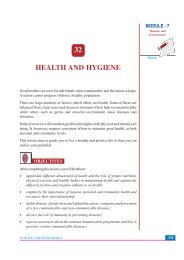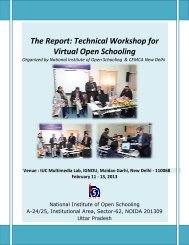2009-10 (16.6 MB) - The National Institute of Open Schooling
2009-10 (16.6 MB) - The National Institute of Open Schooling
2009-10 (16.6 MB) - The National Institute of Open Schooling
Create successful ePaper yourself
Turn your PDF publications into a flip-book with our unique Google optimized e-Paper software.
1. Executive Summary<br />
<strong>National</strong> <strong>Institute</strong> <strong>of</strong> <strong>Open</strong> <strong>Schooling</strong><br />
<strong>The</strong> <strong>National</strong> <strong>Institute</strong> <strong>of</strong> <strong>Open</strong> <strong>Schooling</strong> (NIOS)<br />
was established by the Ministry <strong>of</strong> Human Resource<br />
Development, Government <strong>of</strong> India in November,<br />
1989 as an autonomous organization. Broadly, NIOS<br />
has two fold objectives. <strong>The</strong> first is to provide<br />
opportunities <strong>of</strong> continuing and developmental school<br />
education, and the second is to exercise normative<br />
and coordinating function while promoting standards<br />
in open schooling. <strong>The</strong> programmes <strong>of</strong> NIOS are<br />
open for all with a special focus on marginalized<br />
groups, namely rural youth, girls and women,<br />
scheduled castes, scheduled tribes, differently abled<br />
and ex-servicemen. NIOS is also an examining and<br />
certifying institution, and its certificates are recognized<br />
by major Boards and institutions for further education<br />
as well as for jobs.<br />
<strong>The</strong> NIOS headquarters is in NOIDA, U.P. <strong>The</strong><br />
authority specified for its management are, General<br />
Body, Executive Body, and Finance Committee. <strong>The</strong><br />
Chairman is the Chief Executive Officer <strong>of</strong> NIOS.<br />
NIOS functions through five departments, namely:<br />
Academic, Vocational Education, Student Support<br />
Services, Evaluation, and Administration. In the period<br />
under review, the NIOS functioned through 11<br />
Regional Centres at Allahabad, Bhopal, Chandigarh,<br />
Delhi, Guwahati, Hyderabad, Jaipur, Kochi, Kolkata,<br />
Patna, and Pune and 3 sub-centres at Dehradun,<br />
Bhubaneswar and Darbhanga. However, to provide<br />
better access to the learners and to reachout to the<br />
prospective client groups, NIOS in its 55 th EB meeting<br />
approved the setting <strong>of</strong> three new Regional Centres<br />
at Bengaluru, Gandhi Nagar and Imphal, and a new<br />
regional sub-centre at Visakapatnam. <strong>The</strong> sub-centres<br />
<strong>of</strong> Dehradun and Bhubaneswar were upgraded as<br />
Regional Centres. Thus at the end <strong>of</strong> the year, NIOS<br />
had sixteen regional centres, and two regional subcentres.<br />
NIOS proposes to set up new regional centres<br />
in the states <strong>of</strong> Jammu and Kashmir, Himachal Pradesh,<br />
Haryana, Chhattisgarh, Tamil Nadu and Jharkhand<br />
thereby achieving the XI th Five Year Plan mandate <strong>of</strong><br />
having at least one Regional Centre in different States<br />
and Union Territories <strong>of</strong> India.<br />
Academic Programmes<br />
Under the Academic Department, NIOS <strong>of</strong>fers a<br />
continuum for school education, from Basic Education<br />
to Senior Secondary Education.<br />
<strong>The</strong> <strong>Open</strong> Basic Education (OBE) is <strong>of</strong>fered for two<br />
categories <strong>of</strong> learners for children in the age group 6-<br />
14, and for adults <strong>of</strong> 15 years and above. <strong>The</strong>se<br />
courses are <strong>of</strong>fered at three levels: A, B and C which<br />
are equivalent to standard III, V and VIII <strong>of</strong> formal<br />
schooling. During the year under review, 13<br />
workshops were organised for review <strong>of</strong> study<br />
material in the subjects <strong>of</strong> Hindi, English,<br />
Environmental Science and Maths. Two meetings<br />
were held related to the work <strong>of</strong> accreditation <strong>of</strong><br />
partner agencies. As on March 31, 20<strong>10</strong>, NIOS has<br />
683 Accredited Agencies (AAs) that <strong>of</strong>fer <strong>Open</strong> Basic<br />
Education programmes located in almost all the states<br />
and Union Territories which has increased by 19 AAs<br />
from last year. <strong>The</strong> AAs may have several study<br />
centres in the area <strong>of</strong> their operation. As on<br />
March 31, 20<strong>10</strong>, the registration <strong>of</strong> students at various<br />
levels in OBE programmes was 34,313 and the NIOS<br />
had certified 35,922 learners under OBE together<br />
with the students registered earlier. Altogether, from<br />
the inception <strong>of</strong> the OBE programme, the NIOS has<br />
certified 3,46,190 learners.<br />
For the secondary and senior secondary courses, the<br />
NIOS carried out the tasks <strong>of</strong> course development,<br />
course revision, revision <strong>of</strong> Laboratory Manual,<br />
development <strong>of</strong> Question Banks, development <strong>of</strong><br />
Tutor Marked Assignments, and standardization <strong>of</strong><br />
Marking Schemes. <strong>The</strong>re were 90 workshops in<br />
these areas in which 431 resource persons were<br />
involved. Three new courses, namely Painting at<br />
secondary level, Sanskrit and Mass Communication<br />
at senior secondary level were introduced during this<br />
period. At the Senior Secondary level, the learning<br />
material in the subject <strong>of</strong> History was revised while<br />
work was underway to develop learning materials for<br />
a new course on Environmental Science which would<br />
be introduced in the 2011-12 Academic Session.<br />
Another important achievement <strong>of</strong> the year in the<br />
academic field was the development <strong>of</strong> Question<br />
banks for On Demand Examination System in different<br />
subjects <strong>of</strong>fered at Senior Secondary level. Hitherto<br />
Annual Report <strong>2009</strong>-<strong>10</strong> 1


